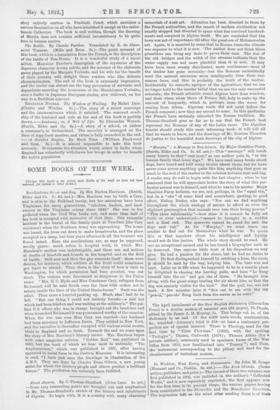About Algeria. By C. Thomas-Stanford. (John Lane. 5s. not.) —Some
very interesting points are brought out and emphasized in Mr. Thomas-Stanford's sketch of the history and inhabitants of Algeria. To begin with, it is a country with many charming
memorials of Arab art. Attention has been directed to these by the French authorities, and the march of modern civilization not exactly stopped but diverted to spare what has survived bombard- ments and conquest in Algiers itself. We are reminded that the town was not of importance till after the great era of Mohammedan art. Again, it is asserted by some that in Roman times the climate was superior to what it is now. The author does not think these grumblers can bring any facts to prove their case. The size of the old bridges and the width of the streams indicate that the water supply was not more plentiful than it is now. It may have been more evenly distributed, more continuous—most of the timber has gone certainly—but the Romans undoubtedly used the natural resources more intelligently than their suc- cessors have, and this is probably the truth of the matter. Incidentally ho remarks, apropos of the agriculture, that we can no longer hold to the insular belief that we are the only successful colonists; the French colonists round Algiers have done wonders, and their vines, when those of France fail, help to snake up the amount of burgundy, which is, perhaps, none the worse for coming from Africa. Algerian roads did not exist before the French conquest I now they are second to none. In this particular the French have certainly inherited the Roman tradition. Mr. Thomas-Stanford goes so far as to say that the French best represent the Romans of any of the Latin races. The Algerian tourist should study this most informing book : it will tell all that he wants to know, and the drawings of Mr. Dorrien Thoroton do justice to the beautiful Arab doorways of the city of Algiers.














































 Previous page
Previous page